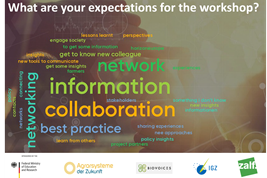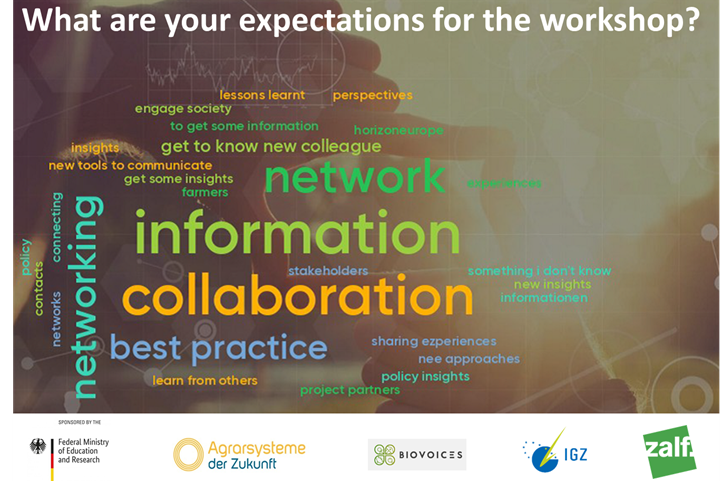10.09.2020

In order to improve the connection between the activities of the BMBF funding measure "Agricultural Systems of the Future" and the European networks and their players, the online workshop "Building Networks" was held on September 3, 2020. It was hosted by the Leibniz Center for Agricultural Landscape Research Müncheberg (ZALF), supported by the Leibniz Institute of Vegetable and Ornamental Crops (IGZ) and the European network BIOVOICES.
The aim of this workshop was to strengthen cooperation between the various research consortia and different actors in the fields of policy making, research funding, research and transfer networks as well as agricultural policy advocacy. At the same time, the consortia are thus given the opportunity to give their research a better European visibility.
At the beginning, several keynote speeches provided important initial points for further action. Peter Wehrheim, Head of the Unit "Food Systems and Bioeconomy" of the European Commission in Brussels, gave an introduction to the current developments of bioeconomy strategies at the European level. The National Contact Point Life Sciences/Bioeconomy, represented by Dr. Jill Ebert and Mareike Schmitt from KoWi (Cooperation Centre EU of Science Organisations), highlighted different European platforms for bioeconomy as well as possibilities for participation in the conception of European research and innovation programmes. Susanna Albertini from the European Bioeconomy Network (EuBioNet) presented the work of her network and drew attention to the high relevance of knowledge exchange for promoting bioeconomy. Chiara Pocaterra from the co-organizer network BIOVOICES presented the work of this multi-stakeholder platform together with the opportunities and challenges it presents. Udo Hemmerling, Vice President of the German Farmers' Association, presented the perspective of farmers and outlined current political developments in Brussels.
After the initial presentations, there was the opportunity for an intensive exchange and networking in smaller groups with the different actors. The discussion focused in particular on questions of participation in European programs and the visibility of research projects beyond the national level. The current developments and effects of COVID-19 were also part of the discussions of the expert team. According to Chiara Pocaterra, in addition to all the restrictions, these would also bring advantages for scientific exchange. Due to the new online formats more actors could be reached and thus involved in strategy processes in this way. This is demonstrated by the relevance of a diverse range of events, both personal and virtual workshops, in order to address as many different actors as possible.
"By exchanging the many different perspectives, the online workshop was an important contribution to expanding the dialogue between the consortia and Europe," stated apl. Prof. Dr. Weith of ZALF. Consequently, it will be important to implement these aspects in future planning and to ensure continuity.
Pictures
For downloading the pictures please click on a picture and use the icon.


Event poster| Source: © U. Weddige / ZALF.
